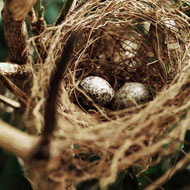Unhatched chicks vibrate to warn nestmates of predators

Chicks that have yet to hatch from their eggs warn nestmates of potential predators by vibrating in their shells.
Chicks that have yet to hatch from their eggs warn nestmates of potential predators by vibrating in their shells, according to new research.
The study, published in the journal Nature Ecology & Evolution, exposed wild-caught eggs to audio playbacks of predator alarm calls. Researchers found that when exposed to the audio, the unborn chicks wiggled inside their shells to indicate a possible threat to their siblings.
The study was led by the Animal Ecology Group at the University of Vigo, Spain.
Lead author Jose Noguera told The Guardian: “We were very surprised. We were aware that bird embryos were able to produce egg vibrations, [but they vibrated] even more than we expected.”
In the study, researchers collected 90 eggs from yellow-legged gulls living on Sálvora Island, Spain. They then divided the eggs into nests of three.
Six days before hatching, the team temporarily removed two of the three eggs in each nest and played them a recording of either white noise or an alarm call. They delivered the noise four times every day, for three minutes each time, until the chicks hatched.
Researchers found that the chicks reacted to the audio by making less noise but vibrating more. This information also seemed to be transmitted to the third egg, still in the nest, which appeared to copy the vibrations.
“This kind of transfer of information – embryo to embryo – can induce developmental changes that can have potential benefits [to the birds] after hatching,” said Noguera.



 The Animal and Plant Health Agency (APHA) has updated its online reporting service for dead wild birds.
The Animal and Plant Health Agency (APHA) has updated its online reporting service for dead wild birds.